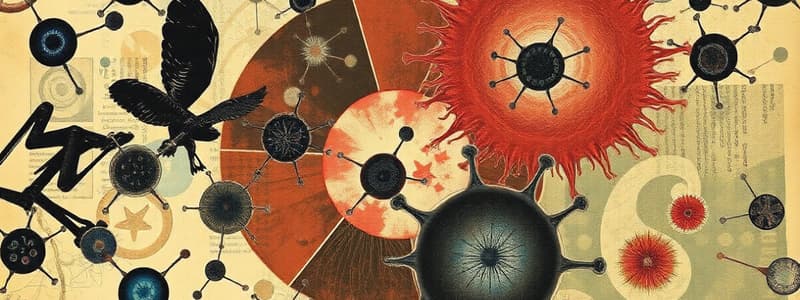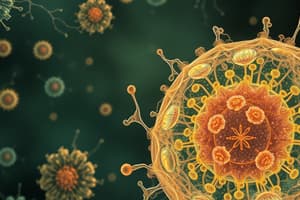Podcast
Questions and Answers
What encodes genetic information in all cells?
What encodes genetic information in all cells?
- DNA (correct)
- RNA
- Proteins
- Carbohydrates
During which process is genetic information passed to daughter cells?
During which process is genetic information passed to daughter cells?
- Transcription
- Metabolism
- Cell division (correct)
- Photosynthesis
What primarily governs the flow of energy within cells?
What primarily governs the flow of energy within cells?
- Genetic encoding
- Nuclear division
- Cellular respiration
- Metabolism (correct)
Which of the following is NOT a basic chemical composition of cells?
Which of the following is NOT a basic chemical composition of cells?
What type of chromosomes do linear strands of DNA represent?
What type of chromosomes do linear strands of DNA represent?
Which cells are characterized by the presence of a nucleus?
Which cells are characterized by the presence of a nucleus?
Which statement about infectious agents like viruses is true?
Which statement about infectious agents like viruses is true?
Which component is essential for all living things, including cells?
Which component is essential for all living things, including cells?
What defines a prokaryotic cell?
What defines a prokaryotic cell?
What is the primary structural basis of chromosomes in cells?
What is the primary structural basis of chromosomes in cells?
What is a foundational principle of the cell theory?
What is a foundational principle of the cell theory?
How do cells reproduce according to the cell theory?
How do cells reproduce according to the cell theory?
What aspect of cells is emphasized in the chapter regarding eukaryotic cells?
What aspect of cells is emphasized in the chapter regarding eukaryotic cells?
Which statement is true regarding prokaryotic and eukaryotic cells as discussed in the chapter?
Which statement is true regarding prokaryotic and eukaryotic cells as discussed in the chapter?
What scientific advancement allowed for the observation of cells leading to the development of cell theory?
What scientific advancement allowed for the observation of cells leading to the development of cell theory?
In the context of cellular biology, what does the term 'unicellular' refer to?
In the context of cellular biology, what does the term 'unicellular' refer to?
Which of the following statements best summarizes the concept of the cell as defined in the chapter?
Which of the following statements best summarizes the concept of the cell as defined in the chapter?
Cell division is crucial for what fundamental concept related to cells?
Cell division is crucial for what fundamental concept related to cells?
Which of the following is NOT a component of the cell theory?
Which of the following is NOT a component of the cell theory?
What was a significant outcome of the development of the microscope in the study of cells?
What was a significant outcome of the development of the microscope in the study of cells?
Which statement correctly describes a key principle of the cell theory?
Which statement correctly describes a key principle of the cell theory?
What is the significance of the statement 'all cells come from pre-existing cells'?
What is the significance of the statement 'all cells come from pre-existing cells'?
Which of the following correctly represents the structural unit of all living things?
Which of the following correctly represents the structural unit of all living things?
What role did the development of the microscope play in the understanding of cells?
What role did the development of the microscope play in the understanding of cells?
What crucial function does cell division serve according to the cell theory?
What crucial function does cell division serve according to the cell theory?
How can cells be characterized according to the modern version of the cell theory?
How can cells be characterized according to the modern version of the cell theory?
Why is it incorrect to say that 'prokaryotic cells are just smaller versions of eukaryotic cells'?
Why is it incorrect to say that 'prokaryotic cells are just smaller versions of eukaryotic cells'?
Which statement indicates a misunderstanding about cells?
Which statement indicates a misunderstanding about cells?
Which conclusion can be drawn from the principle that 'all living organisms are made of cells'?
Which conclusion can be drawn from the principle that 'all living organisms are made of cells'?
What aspect of cells is emphasized in the chapter regarding eukaryotic cells?
What aspect of cells is emphasized in the chapter regarding eukaryotic cells?
What is the shared feature of infectious agents, such as viruses, with living organisms?
What is the shared feature of infectious agents, such as viruses, with living organisms?
Which component of cells is primarily responsible for energy flow management?
Which component of cells is primarily responsible for energy flow management?
Which of the following is a fundamental aspect of cell division?
Which of the following is a fundamental aspect of cell division?
What do eukaryotic cells possess that prokaryotic cells do not?
What do eukaryotic cells possess that prokaryotic cells do not?
Which of these is NOT a characteristic of all living things?
Which of these is NOT a characteristic of all living things?
What aspect of cellular structure is emphasized in eukaryotic cells?
What aspect of cellular structure is emphasized in eukaryotic cells?
What is a key difference between prokaryotic and eukaryotic cells?
What is a key difference between prokaryotic and eukaryotic cells?
What defines the basic chemical composition of all living things?
What defines the basic chemical composition of all living things?
Which process is essential for passing genetic material to daughter cells?
Which process is essential for passing genetic material to daughter cells?
How do viruses differ from other living organisms in terms of structure?
How do viruses differ from other living organisms in terms of structure?
Flashcards are hidden until you start studying
Study Notes
Cell Theory
- The modern version of the cell theory includes four principles: All living organisms are made up of one or more cells, the cell is the structural and functional unit of all living things, all cells come from pre-existing cells through cell division, and all cells contain genetic information encoded in DNA that is passed to daughter cells during cell division.
- Most living organisms are made up of eukaryotic cells.
- Some living organisms are made up of prokaryotic cells.
- All cells contain genetic information encoded in DNA, which is passed to daughter cells during cell division.
- The basic chemical composition of all cells is mostly the same: carbohydrates, nucleic acids, and lipids.
- Metabolism governs the flow of energy within cells.
- The cell theory is a fundamental principle of biology.
- Viruses share some features with living organisms, but are not considered cells.
- The development of the microscope enabled scientists to observe the cell.
Cell Components
- Prokaryotic cells are simpler and smaller than eukaryotic cells.
- Eukaryotic cells are more complex and larger than prokaryotic cells.
- The cell cycle is the process of cell division in eukaryotic cells.
- Prokaryotic binary fission is the process of cell division in prokaryotic cells.
Cell Theory
- Cell Theory states that all living organisms are composed of one or more cells and that all cells come from pre-existing cells
- Unicellular Microorganisms demonstrate that cells can be the building blocks of larger organisms and also exist independently
- The Cell Theory also includes that all cells contain genetic information, encoded in DNA, which is passed to new cells during cell division.
- **The basic chemical composition of all cells is the same. **
- Metabolism governs the flow of energy within cells.
- Infectious Agents such as viruses, while not considered cells, share some features with living organisms.
Studying That Suits You
Use AI to generate personalized quizzes and flashcards to suit your learning preferences.




